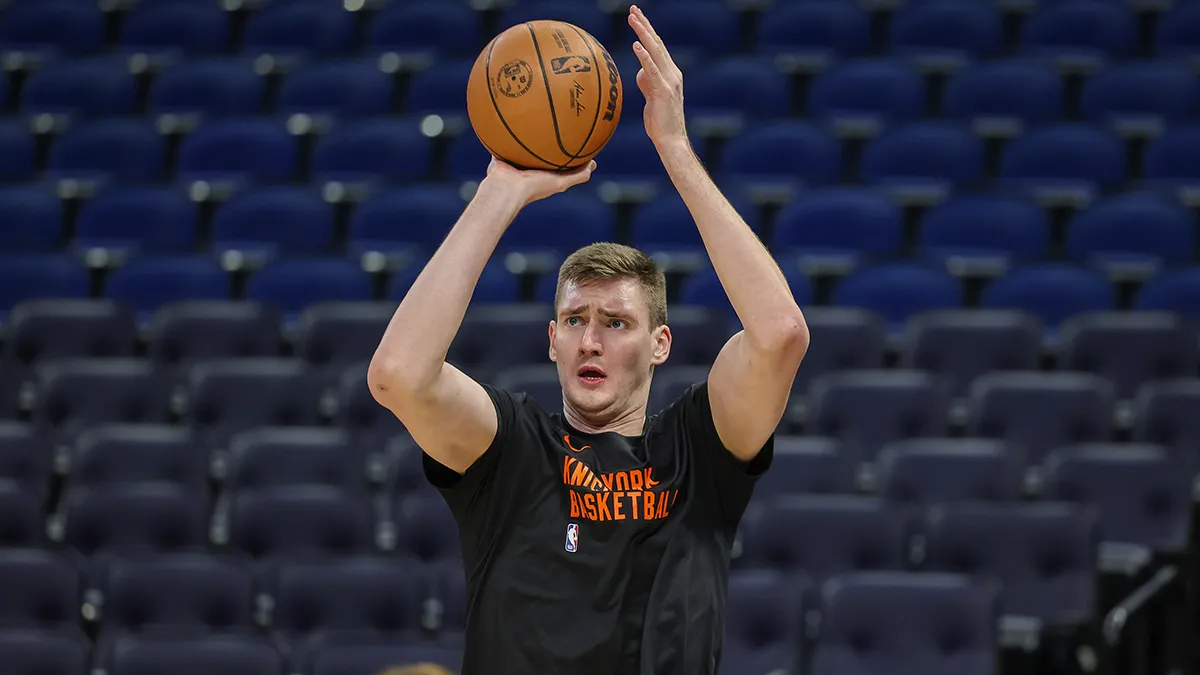
The first time I met John Thompson, he was so into his straight-no-chaser element.
It was Georgetown’s first trip to the Carrier Dome with his prized/polarizing freshman talent, Allen Iverson.
Thompson, who passed away on Monday at age 78, was always protective of his players, but few were guarded as tightly by him as Iverson. It didn’t matter who you were; that wasn’t going to change.
Stay in the game with the latest updates on your beloved Boston sports teams! Sign up here for our All Access Daily newsletter.
A simple, “Hey Allen, how’s it go…” from this reporter just months removed from college graduation, was cut off by Big John immediately.
I won’t get into Big John’s exact words to me but it was to the effect of, "he’ll talk when I say he’s ready to talk and he’s not ready to talk to you … or anybody right now.”
I mentioned that to Big John years later when our paths crossed and reminded him that I was just a young reporter then, trying to do my job.
“And I was doing mine,” Thompson, a former Boston Celtic and Providence College star, said with a stoic expression on his face followed by a slight smile as he gingerly strolled away. “If I don’t look out for my players, who will?”
Boston Celtics
Thompson, who would have turned 79 years old on Wednesday, understood his role in society was more than just being a basketball coach.
He was a father figure to many of his players, a source of inspiration to young Black coaches and an iconic advocate for fighting against issues negatively impacting the Black community.
That meant putting his life on the line by confronting the largest drug dealer in the D.C. area when Thompson felt that drug dealer (Rayful Edmond) was getting too close to his players at Georgetown. That also meant boycotting a game when he felt his talk about the need to reform rules relating to freshman eligibility that he felt were discriminatory, wasn’t getting enough attention.
And yes, it also meant at times shielding his players from an unpredictable contingent of media that — similar to the current state of media — is woefully lacking when it comes to diversity.
Tough, but consistent.
That was Thompson, both on and off the court.
As one of college basketball’s all-time great success stories, that afforded Thompson a platform to speak about racism and other societal injustices in a way that at that time made many uncomfortable.
He didn’t care.
Big John’s commitment to fighting back against a host of societal issues and injustices and their impact on Black people, is very much in line with some of the issues surrounding systemic change that so many NBA players are advocating about now.
* * * * *
You are going to see and read plenty of stories detailing his two seasons with the Celtics and the two titles he won as Bill Russell’s backup while averaging 3.5 points and 3.5 rebounds per game.
During his time at Providence College, Thompson distinguished himself as one of the school’s all-time greats as he left the Friars program as their all-time leader in points, points per game, field goal percentage, while he was second all-time in rebounds.
The tales about his success as the head coach at Georgetown are legendary, with him taking the Hoyas to the Final Four three times while becoming the first Black coach to win an NCAA title in 1984 as part of a coaching career that produced countless All-Americans and four Naismith Basketball Hall of Fame inductees (Patrick Ewing, Alonzo Mourning, Dikembe Mutombo and Iverson).
There were seven Big East Tournament championships and three National Coach of the Year awards as well, not to mention his own induction into the Naismith Basketball Hall of Fame in 2006.
But the legacy left behind by Thompson is so much bigger than the game of basketball.
As a Syracuse, N.Y., native and fan of Syracuse basketball, hating Thompson and the Hoyas was a rite of passage passed down to me and most folks with ties to Upstate New York.
But with Thompson, things were different.
For many Blacks who cheered for the Orange, we hated the fact that we loved Thompson for how he in his own way made so many of us feel empowered in a way no coach or person of significant status did at that time.
Syracuse Orange head coach Jim Boeheim, a staunch rival of Thompson’s for decades, gave some insight into how many Blacks viewed Thompson.
“Bigger than life,” Boeheim said on The Dan Patrick Show. “You could see, here’s a guy that does it his way; he wins, he’s successful. Really, an extraordinarily smart guy who understood what it was about, on the court, off the court.”
When Thompson spoke, you knew you were getting the unfiltered truth and that more likely than not, it was going to make some folks uncomfortable.
He didn’t care. And I’m glad he didn’t care.
Thompson’s persistence when it came to raising issues related to racism was a reminder that having a platform of significance is only useful when you use it.
When NBA players decided to not play in games last week, attention to their already-significant platform increased dramatically. Hurricane Laura was the story at the top of every major news outlet, with the NBA’s boycotting of games a close second or third.
NBA players are doing what the late civil rights activist and House of Representatives member John Lewis would call getting into “good trouble.”
That would surely bring a smile to the usually stoic Big John’s face, as he gingerly walks away.


